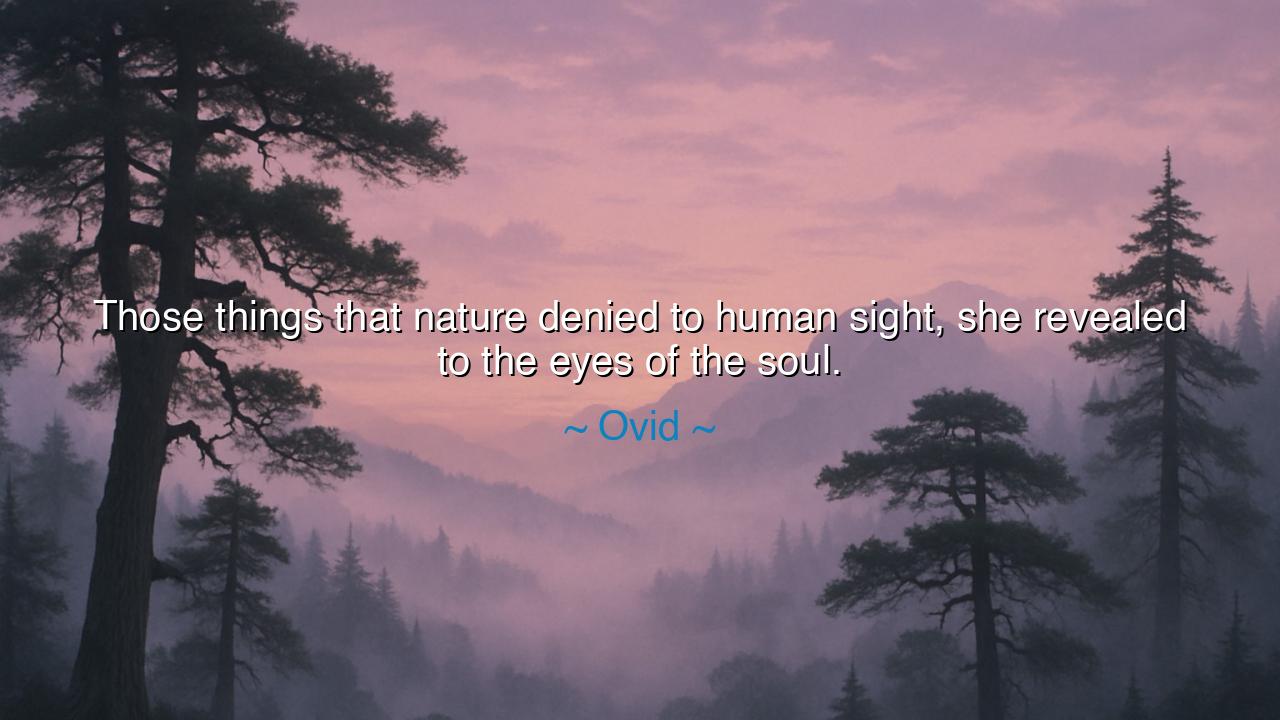
Those things that nature denied to human sight, she revealed to






“Those things that nature denied to human sight, she revealed to the eyes of the soul.” Thus wrote Ovid, the poet of Rome, whose verses captured not only the passions of mortals but the whispers of the divine. In this teaching lies a mystery: that the soul perceives truths the eye cannot. The gaze of the body is bound by the limits of flesh, confined to colors and forms, to things tangible and near. But the gaze of the soul pierces deeper, beholding meanings, mysteries, and eternal realities hidden from the senses.
The meaning of this saying is profound. What Ovid declares is that not all things worth knowing are visible. The sun we can see, but not the love it inspires in us. The stars we can chart, but not the longing they awaken in our hearts. Death we can witness, but the journey of the soul beyond it we cannot. Yet though the eye cannot grasp these things, the soul’s vision apprehends them with certainty. It knows of love, of beauty, of eternity—not because it sees with light, but because it perceives with truth.
This wisdom has echoed across history. Consider Helen Keller, blind and deaf from childhood, who could not see the flowers nor hear the birds, yet declared that she knew beauty, love, and spirit more deeply than those whose senses were whole. Though nature denied her sight, the eyes of her soul were wide open, beholding truths invisible to many. She is a living mirror of Ovid’s words, showing that the greatest realities are not bound by fleshly vision.
The origin of Ovid’s thought rests in the classical world, where philosophers and poets sought to understand the tension between matter and spirit. Plato spoke of the “forms”—eternal truths unseen by mortal eyes but grasped by the mind and soul. Ovid, as poet, clothed this philosophy in beauty: where nature stops, the soul begins. The body’s sight sees appearances; the soul’s sight sees essence. And in this dual vision, humanity finds both its limitation and its greatness.
There is a heroic power hidden in this teaching. For when storms come, the eye sees only darkness. When nations crumble, the eye sees only ruin. But the soul’s sight beholds hope, meaning, and the seeds of renewal hidden within despair. Thus, those who learn to see with the inner vision cannot be broken by appearances. They become like prophets and poets, able to stand firm when others falter, because they perceive what lies beyond the veil.
The lesson for us is to cultivate the sight of the soul. Do not trust only what is visible, for appearances often deceive. Look deeper into people, beyond their faces and circumstances, into the truths of their hearts. Look deeper into suffering, and perceive the hidden strength and wisdom it brings. Look deeper into the world itself, and see not only its surface, but its spirit. In doing so, you will walk not as one blind, but as one enlightened, even when the eyes of flesh fail.
Therefore, dear listener, engrave Ovid’s wisdom upon your heart: what nature withholds from the eye, she grants to the soul. Trust this vision. When you feel blind in the face of hardship, when the world seems barren, when the visible brings only despair—close the eyes of the body, and open the eyes of the soul. For it is there, and only there, that you will behold the eternal truths that guide us: love, beauty, hope, and the immortal spark that binds us to the divine.






AAdministratorAdministrator
Welcome, honored guests. Please leave a comment, we will respond soon